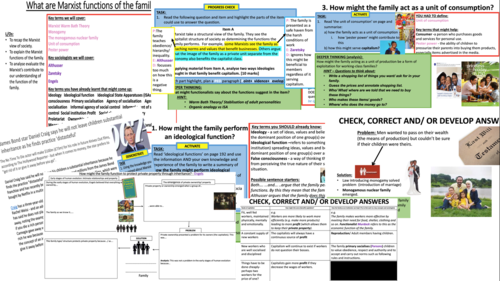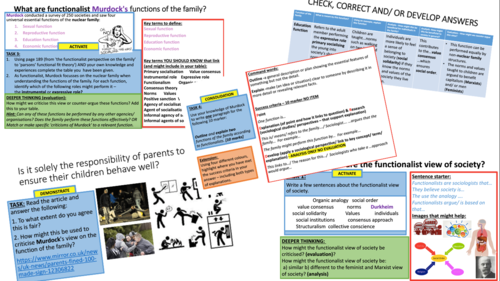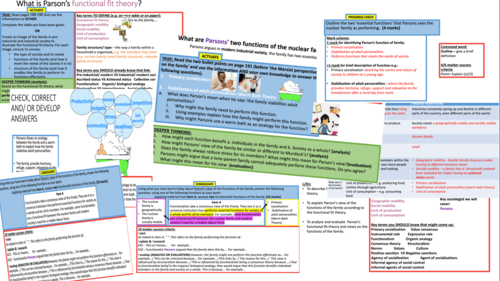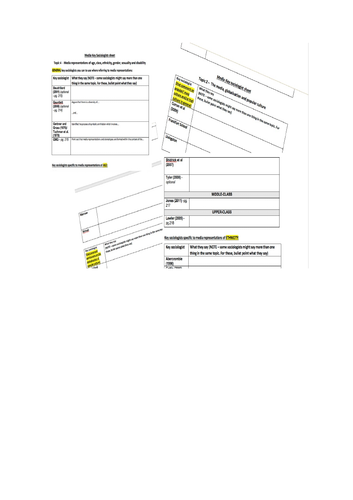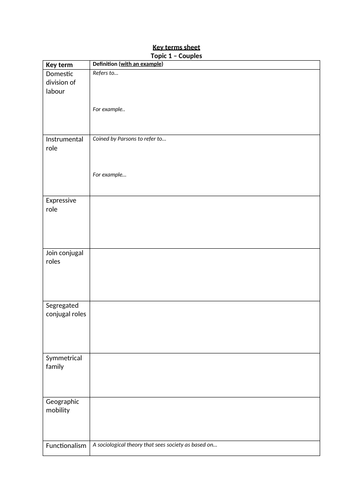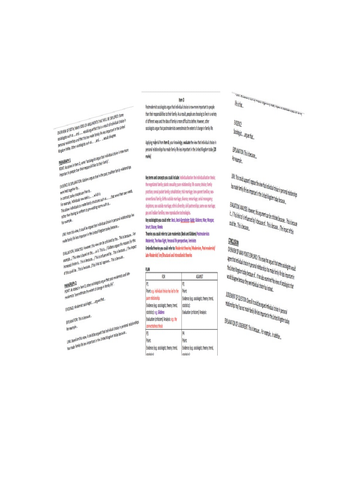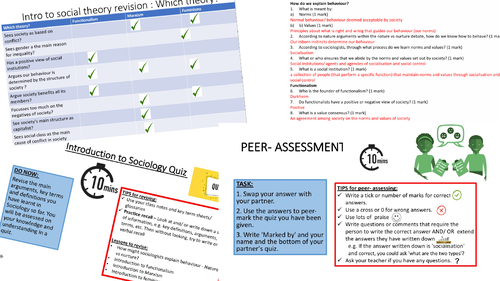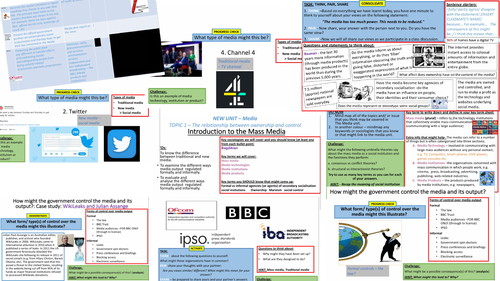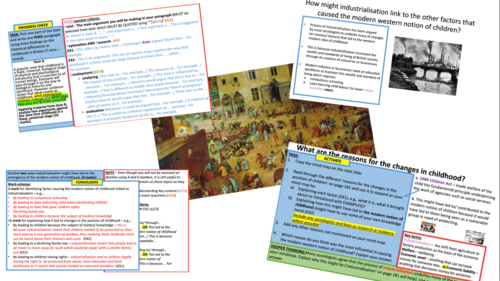
153Uploads
20k+Views
4k+Downloads
Sociology

AQA A-level Sociology Families: Theories of the family – Marxist functions of the family
Detailed and differentiated (up and down) student-led lesson that examines, analyses and evaluates Marxists Althusser, Zaretsky and Engels’ views and functions of the family.
Lesson explores the concepts: Marxist Warm Bath Theory, Monogamy , The monogamous nuclear family , Unit of consumption, Pester power, ideology, ideological function, false consciousness
Lesson makes links to general Marxist key terms and other family key terms that students might have previously been taught.
Main activities makes reference to AQA A-level Book 1 by Townsend
Includes exam questions and guidance for answering them.
***** MOST ACTIVITIES INCLUDE ANSWERS****
Starter assesses prior learning on Parson’s functions of the family
***** WORKSHEETS AT THE END OF THE PPT****

AQA A-level Sociology Families: Theories of the family - Murdock’s four functions of the family
Detailed and differentiated (up and down) student-led lesson that recaps the functionalist view of society and examines and evaluates functionalist Murdock’s four functions: Sexual function , Reproductive function , Education function , Economic function.
Lesson makes links to other functionalist and family key terms that students might have previously been taught.
Main activity makes reference to AQA A-level Book 1 by Townsend but an alternative book that covers this content can be used.
MAIN ACTIVITY INCLUDES ANSWERS
Starter assesses prior learning on Childhood topic.
WORKSHEETS AT THE END OF THE PPT

AQA A-level Sociology Families: Theories of the family – Parson’s view of the family
Detailed and differentiated (up and down) student-led lesson that examines, analyses and evaluates functionalist Parsons view of the family (functional fit theory) and his functions (mainly stabilisation of adult personalities – NOT primary socialisation).
Lesson explores the key terms: Functional fit theory, Stabilisation of adult personalities (Warm Bath Theory), Functional fit theory, Geographic mobility, Social mobility, Unit of production and Unit of consumption.
Lesson makes links to general functionalist key terms and family key terms that students might have previously been taught.
Main activity makes reference to AQA A-level Book 1 by Townsend
***** MOST ACTIVITIES INCLUDE ANSWERS****
Starter assesses prior learning on family topics: couples, childhood and Murdock’s functions.
***** WORKSHEETS AT THE END OF THE PPT**

KEY SOCIOLOGISTS SHEETS AQA A-level Sociology Media: Topics 1-4
Detailed and scaffolded (e.g. SOME sentence starters/ prompts, separating sociologists who comment on different aspects of each topic, SOME page numbers for sociologists that might be more difficult to find, etc.) key sociologists sheets that requires students to write done what key sociologists from topics 1-4 say.
Contains the main key sociologists in Topics 1-4 of the media unit for AQA A-level Sociology:
Topic 1 - Ownership and control of the media output
Topic 2 - The media, globalisation and popular culture
Topic 3 -the processes of selection and presentation of the content of the news
Topic 4 -media representations of age, social class, ethnicity, gender, sexuality and disability.
**REQUIRES textbook - 'SOCIOLOGY For AQA Volume 2 by Browne, Blundell & Law **

KEY TERMS SHEET - AQA A-level Sociology Families: Topic 1 Couples
Key term sheet for AQA A-level Sociology Family Topic 1 Couples that requires students to fill out the definitions themselves. Includes some sentence starters for more difficult topics.
Good form of revision for students and can be used as a revision resource to develop AO1 once filled out.
**BASED ON CONTENT in textbook - AQA A Level Sociology Book One Including AS Level: Book one 3rd Revised edition by Rob Webb, Hal Westergaard, Keith Trobe, Annie Townend ’ textbook

WRITING FRAME - AQA A-level Sociology: Families – Topic 5 Changing patterns (divorce) 20 marker
Detailed writing frame that scaffolds (from introduction to conclusion) a full answer for a 20 marker on divorce (family -topic 5 changing family patterns). Models how to use the item to select points or arguments to answer the question.
*** Based on AQA specification**
Supports students with planning the 20 marker - using planning success criteria.
Outlines the success criteria and provides sentence starters for the full essay (intro, main body and conclusion). Success criteria used for paragraphs in main body of essay is PEELE/A
Outlines the key terms, sociologists, theories that can be used when answering the question.
Supports students who need support and guidance with writing essays whilst providing students who are already good at writing essays opportunities to further improve their essay skills.

WRITING FRAME - AQA A-level Sociology: Families – Topic 4 Demography (position of old) 20 marker
Detailed writing frame that scaffolds (from introduction to conclusion) a full answer for a 20 marker on whether the posiiton of the old is changing for the better. (family -topic 4 demography).
*** Based on AQA specification**
Models and students with how to use the item to answer essays.
Outlines the success criteria and provides sentence starters for the full essay (intro, main body and conclusion). Success criteria used for paragraphs in main body of essay is PEELE/A
Outlines the key terms, sociologists, theories that can be used when answering the question.
Supports students who need support and guidance with writing essays whilst providing students who are already good at writing essays opportunities to further improve their essay skills.

WRITING FRAME - AQA A-level Sociology: Families – Topic 6 Family diversity 20 marker
Detailed writing frame that scaffolds (from introduction to conclusion) a full answer for a 20 marker on evaluating the view that individual choice in personal relationships has made family life less important in the United Kingdom today (family -topic 6 family diversity).
*** Based on AQA specification**
Models and supports students with how to use the item to select points or arguments to answer the question and how to plan essays using planning success criteria.
Outlines the success criteria and provides sentence starters for the full essay (intro, main body and conclusion). Success criteria used for paragraphs in main body of essay is PEELE/A
Outlines the key terms, sociologists, theories that can be used when answering the question.
Supports students who need support and guidance with writing essays whilst providing students who are already good at writing essays opportunities to further improve their essay skills.
Bundle

WRITING FRAMES (for improving essay writing) - AQA A-level Sociology: Families – Topics 2-6 20 marker
Detailed writing frame that scaffolds (from introduction to conclusion) a full answer for a 20 marker on:
Topic 2 - Childhood - evaluate explanations of childhod
Topic 3 - Theories of the family - whether the family is beneficial
Topic 4 - Demography - position of the old
Topic 5 - Changing family patterns -divorce
Topic 6 - Family diversity - whether individual choice in personal relationships has made family life less important
*** Based on AQA specification**
*** Supports students with planning the 20 marker (using the item) - using planning success criteria.
**
*** Outlines the success criteria and provides sentence starters for the full essay (intro, main body and conclusion). Success criteria used for paragraphs in main body of essay is PEELE/A**
*** Outlines the key terms, sociologists, theories that can be used when answering the question.**
*** Supports students who need support and guidance with writing essays whilst providing students who are already good at writing essays opportunities to further improve their essay skills. **
Bundle

PREPARING FOR THE EXAM - Family Revision and Essay Writing Bundle
Bundle includes:
Family PLC - EDITABLE - Personal Learning Checklist for the Families and Households unit in the the AQA A-level Sociology syllabus. PLC includes topic and page numbers from the Westergaard and Townsend book one for content students my find hard to locate.
Revision lessons that recaps content and/ or focusses on developing exam techniques for family topics 1-7:
-Topic 1 - Couples - also focusses on exam techniques - AO1, AO2 & AO3
-Topic 2 - Childhood
-Topic 3 - Theories of the family - focusses on AO1 & AO3
-Topic 4 - Demography - briefly focusses on all AOs but mainly AO2 for 10 markers
-Topic 5 - Changing Family patterns - focusses on AO2
-Topic 6 - Family diversity
-Topic 7 -Families and Social policy - focusses on planning essays using the item.
Five writing frames for 20 markers on family topics 2-6:
Detailed writing frame that scaffolds (from introduction to conclusion) a full answer for a 20 marker on:
-Topic 2 - Childhood - evaluate explanations of childhod
-Topic 3 - Theories of the family - whether the family is beneficial
-Topic 4 - Demography - position of the old
-Topic 5 - Changing family patterns -divorce
-Topic 6 - Family diversity - whether individual choice in personal relationships has made family life less important
Writing frames:
Supports students with planning the 20 marker (using the item) - using planning success criteria.
Outlines the success criteria and provides sentence starters for the full essay (intro, main body and conclusion). Success criteria used for paragraphs in main body of essay is PEELE/A**
-Outlines the key terms, sociologists, theories that can be used when answering the question.**
-Supports students who need support and guidance with writing essays whilst providing students who are already good at writing essays opportunities to further improve their essay skills. **
Bundle

AQA A-level Sociology Revision lessons for family unit
Detailed and differentiated (up and down) revision lessons for each topic within the family unit of AQA specification. Includes:
Topic 1 - Couples - also focusses on exam techniques - AO1, AO2 & AO3
Topic 2 - Childhood
Topic 3 - Theories of the family - focusses on AO1 & AO3
Topic 4 - Demography - briefly focusses on all AOs but mainly AO2 for 10 markers
Topic 5 - Changing Family patterns - focusses on AO2
Topic 6 - Family diversity
Topic 7 -Families and Social policy - focusses on planning essays using the item.

AQA A-level Sociology: How to further develop exam answers using the AOs? - Couples Revision
Detailed and differentiated (up and down), student led lesson that teaches exam skills and recaps ‘Couples’ content of AQA specification; recaps the main sociologists and themes in the ‘Family’ unit, Topic 1 – Couples WHILST teaching students how to use the Assessment Objectives (AOs) -AO1, AO2, AO3- to further develop their answers using MODEL ANSWERS and examples.
NOTE – Students will need to have gone over or have a basic understanding of using a set success criteria or writing format for their paragraphs TO BE ABLE TO GAIN THE MOST OF OUT THIS LESSON – this lesson using set success criteria PEELE/A (for 20 markers) and PERD (for 10 markers).
**RESOURCES CAN BE FOUND AT THE END OF THE PPT.
**
**ANSWERS FOR MOST OF THE ACTIVITIES CAN BE FOUND ON NEXT SLIDE AFTER ACTIVITY SLIDE
**

Introduction to Sociology QUIZ
Includes:
small revision activity
25 min quiz (on nature vs nurture, key functionalist, Marxist, feminist’s ideas and terminology) —LESSONS CAN BE FOUND ON MAIN PAGE.
answers/ mark-scheme
scaffolding for students to peer assess (but quiz can also be marked by teacher)
Can be used for any spec
Made for A-level students but can be differentiated down for GCSE.

Introduction to the Mass Media (& informal and formal controls of output/ content)
Detailed and differentiated (up and down), student led lesson that introduces students to the different forms of mass media and formal and informal methods used by the government to control media output formally and informally.
Examines the following concepts:Mass media, Media technologies , Media institutions, Media products.
**Made for AQA A-level **but can be easily used for other specs
ANSWERS TO MAIN ACTIVITIES INCLUDED
RESOURCES FOR LESSON CAN BE FOUND AT THE END OF PTT
**Based on content in textbook - 'SOCIOLOGY For AQA Volume 2 by Browne, Blundell & Law ** - BUT LESSON REQUIRES NO TEXTBOOK
Bundle

AQA A-level Sociology Families: Topic 1 Couples - LESSONS, KEY TERM SHEET & REVISION LESSON
Bundle for AQA A-level Sociology Couples topic in the Families unit. Bundles includes 5 lessons, a key term sheet (for students to fill out) for the topic and a revision lesson (see below for more information on each):
**LESSONS **
Most answers to main activities included. Refers to key terms from previous lessons and units students might know that link and uses and refers to ’ AQA A Level Sociology Book One Including AS Level: Book one 3rd Revised edition by Rob Webb, Hal Westergaard, Keith Trobe, Annie Townend ’ textbook. ALL RESOURCES CAN BE FOUND AT THE END ON THE PPT
L1 - Detailed and differentiated (up and down) student-led lesson that examines and analyses the following key terms to introduce students to the main family structures: Family, Household,Family structure/ type, Nuclear family, Lone-parent family, Same-sex family, Reconstituted family (or blended family) , Beanpole family, Extend family (horizontally and vertically) , Empty-nest family, Cohabitating couples, Contemporary society, Traditional, Family diversity, Living Apart Together/ LATs (extension)
L2 - Detailed and differentiated (up and down) student-led lesson that examines and analyses the following key terms to introduce students to the traditional functionalist (Parsons) view of the domestic division of labour:
Domestic labour , Domestic division of labour, Conjugal roles
Conjugal (extension), Conjugal relationships (extension), Joint conjugal roles, Segregated conjugal roles, Instrumental role, Expressive role, Conjugal relationships (extension), Pre-industrial society (extension), Industrial Revolution (extension),
Consumption (extension)
L3 - Detailed and differentiated (up and down) student-led lesson that examines and analyses the following key terms to examine march of progress and feminist views of how women’s involvement paid work has had an impact on the domestic division of labour:
Dual‐earner couples, The New man, The ‘march of progress’ view
Double shift / dual burden, Triple shift, Emotion work, Cultural/ Ideological explanation (of segregated conjugal roles), Material/ Economic explanation (of segregated conjugal roles)
Ideology, Geographic mobility (extension), Commercialisation (extension)
Examines the ideas of :Young and Wilmott, Oakley, Hochschild , Gershuny/ Sullivan, Ferri and Smith, Crompton and Lyonette
L4 - Detailed and differentiated (up and down) student-led lesson that examines and analyses the following key terms to examine how money might be managed and how decision-making might be organised in families : Power, The allowance system, Pooling, Cultural/ Ideological explanation (of decision making), Material/ Economic explanation of inequality (of decision making),Personal life perspective (of money)
Examines the views of the following sociologists:
PAHL AND VOGLER (1993), Barret and McIntosh, Kempson, EDGELL, Laurie and Gershuny, CROMPTON AND LYONETTE, Pahl
L5 - L5 AQA A-level Families- Couples: Domestic violence
Detailed and differentiated (up and down) student-led lesson that examines and analyses the following key terms to examine patterns and explanations of domestic violence: Domestic violence/ abuse, Radical feminists, Materialism,
Marxist feminism, Radical feminist explanation (of domestic violence)
Marxist feminist explanation (of domestic violence),Materialist explanation (of domestic violence)
Examines the views of the following sociologists: Dobash and Dobash, Millet and Firestone, Wilkinson and Pickett, Ansley
**KEY TERM SHEET **
Key term sheet for AQA A-level Sociology Family Topic 1 Couples that requires students to fill out the definitions themselves. Includes some sentence starters for more difficult topics.
Good form of revision for students and can be used as a revision resource to develop AO1 once filled out.
**BASED ON CONTENT in textbook - AQA A Level Sociology Book One Including AS Level: Book one 3rd Revised edition by Rob Webb, Hal Westergaard, Keith Trobe, Annie Townend ’ textbook
**REVISION LESSON - **
Detailed and differentiated (up and down), student led lesson that teaches exam skills and recaps ‘Couples’ content of AQA specification; recaps the main sociologists and themes in the ‘Family’ unit, Topic 1 – Couples WHILST teaching students how to use the Assessment Objectives (AOs) -AO1, AO2, AO3- to further develop their answers using MODEL ANSWERS and examples.
NOTE – Students will need to have gone over or have a basic understanding of using a set success criteria or writing format for their paragraphs TO BE ABLE TO GAIN THE MOST OF OUT THIS LESSON – this lesson using set success criteria PEELE/A (for 20 markers) and PERD (for 10 markers).
**RESOURCES CAN BE FOUND AT THE END OF THE PPT.
**
**ANSWERS FOR MOST OF THE ACTIVITIES CAN BE FOUND ON NEXT SLIDE AFTER ACTIVITY SLIDE
**

AQA A-level Families - Couples: Money management and decision making
Detailed and differentiated (up and down) student-led lesson that examines and analyses the following key terms to examine how money might be managed and how decision-making might be organised in families : Power, The allowance system, Pooling, Cultural/ Ideological explanation (of decision making), Material/ Economic explanation of inequality (of decision making),Personal life perspective (of money)
Examines the views of the following sociologists:
PAHL AND VOGLER (1993), Barret and McIntosh, Kempson, EDGELL, Laurie and Gershuny, CROMPTON AND LYONETTE, Pahl
***** Makes reference to other key terms students might know that link. **
***** ANSWERS for MAIN activities INCLUDED****
Uses and refers to ’ AQA A Level Sociology Book One Including AS Level: Book one 3rd Revised edition by Rob Webb, Hal Westergaard, Keith Trobe, Annie Townend ’ textbook

AQA A-level Families- Couples: Intro to the family structures/ types
Detailed and differentiated (up and down) student-led lesson that examines and analyses the following key terms to introduce students to the main family structures: Family, Household,Family structure/ type, Nuclear family, Lone-parent family, Same-sex family, Reconstituted family (or blended family) , Beanpole family, Extend family (horizontally and vertically) , Empty-nest family, Cohabitating couples, Contemporary society, Traditional, Family diversity, Living Apart Together/ LATs (extension)
***** ANSWERS for MOST MAIN activities INCLUDED****
***** ALL RESOURCES INCLUDED AND CAN BE FOUND OUT THE END OF PPT *****

AQA A-level Families- Couples: Traditional views of the domestic division of labour
Detailed and differentiated (up and down) student-led lesson that examines and analyses the following key terms to introduce students to the traditional functionalist (Parsons) view of the domestic division of labour :
Domestic labour , Domestic division of labour, Conjugal roles
Conjugal (extension), Conjugal relationships (extension), Joint conjugal roles, Segregated conjugal roles, Instrumental role, Expressive role, Conjugal relationships (extension), Pre-industrial society (extension), Industrial Revolution (extension),
Consumption (extension)
***** Makes reference to other key terms students might know that link. *****
***** ANSWERS for MAIN activities INCLUDED****
***** ALL RESOURCES INCLUDED AND CAN BE FOUND OUT THE END OF PPT *****

A-level AQA Families Topic 2 Childhood– The historical differences in childhood
Detailed and differentiated student-led lesson that explores Pre-industrial society, Industrialisation, Modern western notion of childhood, ‘cult of childhood’, Child-centredness/centred society , Infant mortality, as a way to examine Aries views and explanations of the historical differences in western childhood.
Activities require pages from the AQA A Level Sociology Book One Including AS Level: Book one 3rd Revised edition by Rob Webb, Hal Westergaard, Keith Trobe, Annie Townend
RESOURCES CAN BE FOUND AT THE END OF PPT
STUDENT-FRIENDLY MARK-SCHEME INCLUDED FOR 4 MARKER

AQA A-level Sociology: Education Topic 3 Ethnic differences - Institutional racism
Detailed and differentiated (up and down) student led lesson that explores the following so students are able to understand institutional racism and explain how it might cause ethnic differences in achievement: Institutional racism, Marketisation (extension), The New IQism, Ethnocentric, Ethnocentric curriculum, Model minorities, The foundation stage profile (FSP), Aim Higher initiatives/ programmes
Covers the ideas of Troyna and Williams Gillborn, David, Ball, Sewell (as a criticism)
Covers criticisms of Gillborn’s arguments
Includes answers for MOST activities - NOTE - NO ANSWERS FOR ‘DO NOW’ but can be done on the board with students.
Makes some links to the following key terms students should know:
Internal vs External factors, Cultural vs Material factors, Social processes, Labelling, Streaming, Self-fulfilling prophecy
NOTES:
-Uses and refers to ’ AQA A Level Sociology Book One Including AS Level: Book one 3rd Revised edition by Rob Webb, Hal Westergaard, Keith Trobe, Annie Townend ’ textbook
-RESOURCES CAN BE FOUND AT THE END OF THE PPT.

